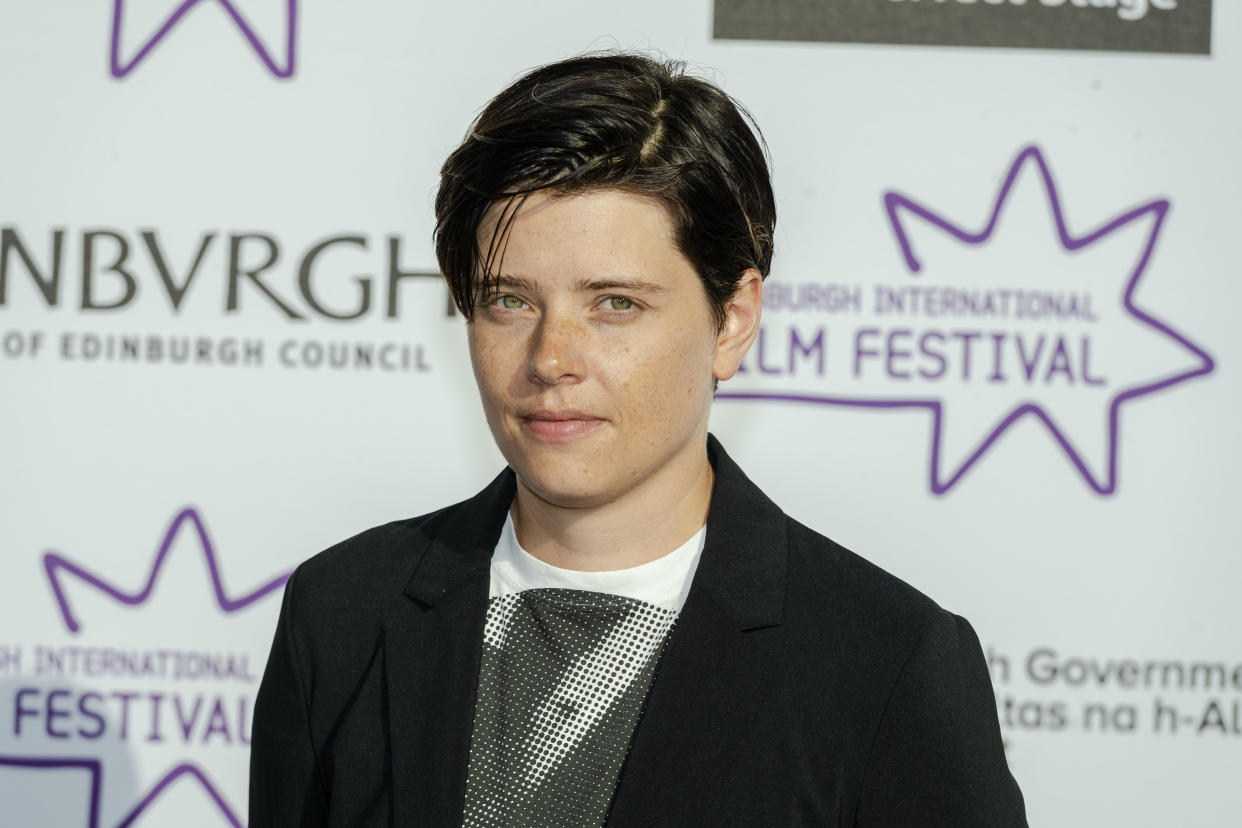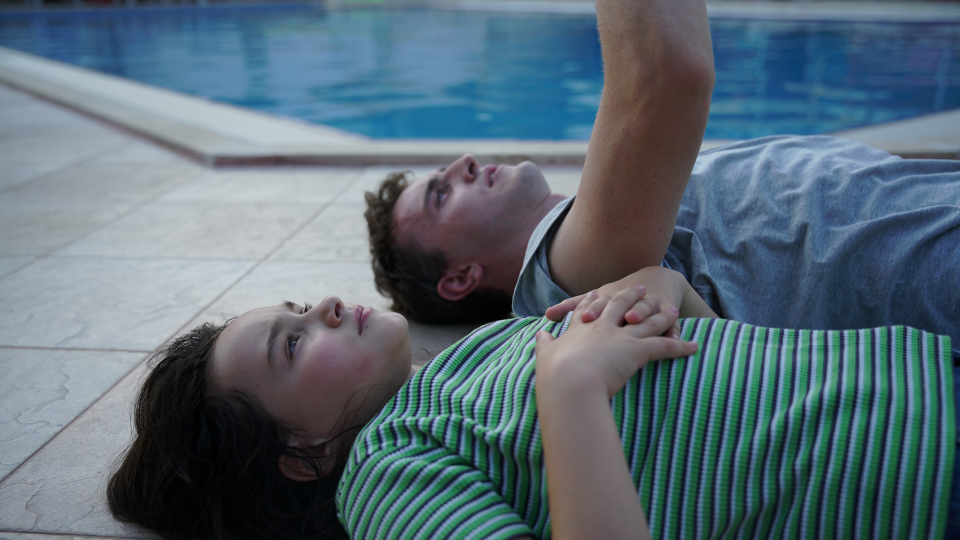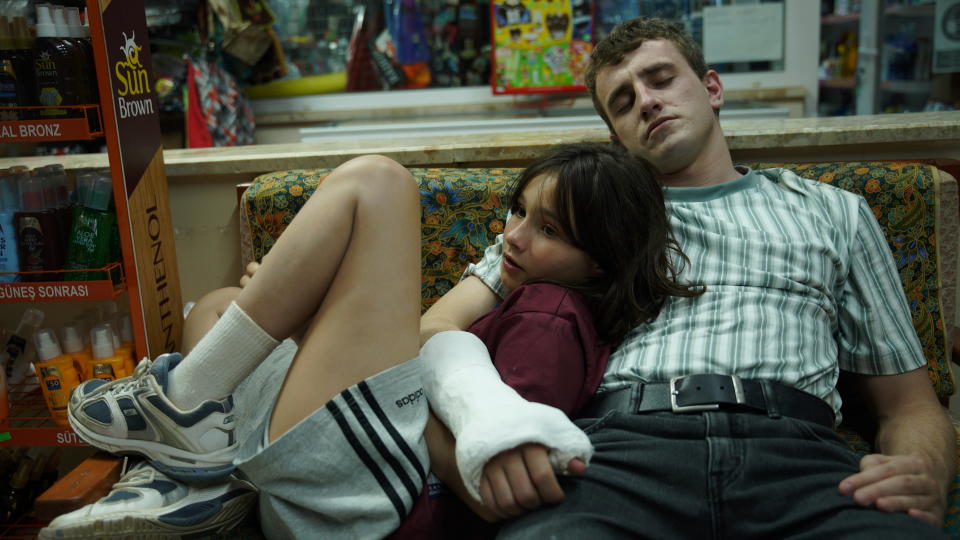Barry Jenkins and Adele Romanski Had to Give Up on ‘Aftersun’ Before Charlotte Wells Could Finish It

- Oops!Something went wrong.Please try again later.
- Oops!Something went wrong.Please try again later.
- Oops!Something went wrong.Please try again later.
Charlotte Wells’ breakout moment has been a long time coming. Over the past decade, the 35-year-old Scottish filmmaker attended film school with business aspirations, directed a handful of short films, and produced a low-budget feature. By the time her feature-length debut “Aftersun” made waves at Cannes, scored distribution with A24, and established her as a major new filmmaking talent, she had been tinkering with the project for years.
“There was a mystery to the process of discovering exactly what it was,” Wells said in an interview with IndieWire from A24’s New York offices this month. “It was a challenging project to describe to people and a challenging script to read.”
More from IndieWire
That’s because “Aftersun” hovers in a state of poetic mystery from start to finish. The layered drama finds 12-year-old Sophie (Frankie Corio) on vacation at a Turkish resort with her father Calum (Paul Mescal) in the 1990s, while the adult Sophie recalls their time together. The movie exists almost exclusively within Sophie’s delicate memories as she sifts through recollections of her single father as a troubled man attempting to hide his full emotional state from his daughter’s prying eyes. Shot in lush 35mm, “Aftersun” is the most evocative look at an adolescent gaze coming to terms with the adult world since “Moonlight.”
It should come as no surprise, then, that “Aftersun” was shepherded along by Pastel, the production company co-founded by “Moonlight” director Barry Jenkins and his longtime producing partner Adele Romanski. It was Romanski who pushed her old film school pal Jenkins to get cracking on “Moonlight” after years of hesitation, and she found herself in a similar position when she first encountered Wells in 2017.
“Her short films were pretty fucking brilliant,” Romanski said in a phone interview, joined by Jenkins. Romanski recalled her first lunch meeting with Wells, while Pastel was shooting Jenkins’ “If Beale Street Could Talk” in New York, as an intriguing first step. “I was curious to hear what she was working on and how the storytelling style for her shorts would translate into that longer format,” Romanski said. “Then we waited patiently for years.”
Wells found herself struggling through the seed of an idea — a father and daughter on vacation together, where secrets bubble to the surface — but couldn’t get much further (the story is not autobiographical). “I kept promising them a script,” Wells said. “I kept saying, ‘Give me two weeks.’ It was always a constant source of stress. I knew that’s how long it would take me to write it. I just couldn’t quite make that day come. Eventually it came after they had stopped calling.”
On the Pastel side, Wells seemed to be dragging her feet even by their own standards.
“There was a joke in the company,” Romanski said. “We would take her out to dinner or brunch and it was getting to the point where ‘The Charlie Wells Expense Account’ was getting very, very long. We were like, ‘OK, we love her — but if she doesn’t start on something soon, we’re going to have to cut her off.’” Jenkins, however, said he understood the delay. “We’re always very patient,” he said. “The thing we’re always trying to do is create a film that can live in a filmmaker’s voice even if it’s their first time. Part of that process is not prodding the person.”

Courtesy of A24
When Wells finally retreated into a two-week writing frenzy in 2019, “I needed the space, because I knew if I didn’t get it together, the opportunity would no longer be there.” She held onto her first draft for half a year before sending to Pastel. “I spent six months pretending to rewrite but in actual fact just spellchecking it over and over again,” she said.
When Wells was growing up in Scotland, she didn’t harbor aspirations as a filmmaker, and only wound up attending NYU’s dual MFA/MBA program after helping a friend’s business in London sparked her interest in working as a producer. In film school, however, Wells was inspired by a smorgasbord of international cinema. Now, she can rattle off a list of names as if sorting through the video rental store of her mind: Jacques Audiard, the Dardenne brothers, Lynne Ramsay, Andrea Arnold, Edward Yang, Wong Kar Wai, Joanna Hogg, Kelly Reichardt, Claire Denis.
More recently, she said, she has been on a Chantal Akerman kick. Her own filmmaking reflects this range of work less in terms of specific references than an overall confidence in visual storytelling ripe for interpretation. “I still have a lot of catching up to do,” she said. “I was pretty late to this.”
It didn’t take long for Wells’ priorities to evolve beyond producing after she had several accomplished filmmakers as her instructors, including Kasi Lemmons, Alexandre Rockwell, and Todd Solondz. It was the “Welcome to the Dollhouse” director who first told Wells that one of her script ideas had potential, and he has kept tabs on her progress since then. “I love Charlotte’s films,” he told me, calling them “sensitive and nuanced, loving but unsentimental. There is an intelligence at work that I always recognize, and I have no idea how she elicits such beautiful performances from her actors. She deserves all the acclaim she has been receiving.”
Indeed, Wells’ three short films and “Aftersun” all feature the same precise calibration of tone and internal meanings. Her characters struggle to express their frustrations in a world that boxes them in. Her beguiling 2017 short “Blue Christmas” finds a debt collector avoiding his emotionally unstable wife through work, while the harrowing “Laps” revolves around a young woman getting sexually harassed on the New York City subway.
In “Aftersun,” Calum’s personal hardships linger just on the brink of clarity — we eventually learn that he’s quite sad, though it’s never spelled out exactly why — and his grown-up daughter continues to fight through their elusive encounters to better comprehend him. Wells intersperses a jarring rave sequence throughout the movie, which finds the adult Sophie confronting her father under allegorical circumstance through the abstraction that pure movement provides. It’s a powerful device that takes a rather straightforward scenario and elevates it to lyrical heights.
“In a lot of ways, there was a mystery to the process of discovering exactly what this was,” Wells said. “So much of the process found its way into the film. The process of rooting through the past and memories and allowing some to rise to the surface, transforming them or reframing them.”

Wells knows that people emerge from “Aftersun” with questions about the specific circumstances at hand: Did Sophie’s father die? If so, how? And what’s making him so bummed out? She knows all the answers, even if she won’t reveal them. “For me, this is this interesting balance between subtlety and withholding information,” she said. “I don’t know that I set out to be ambiguous. I did set out to withhold for a certain amount of time. Withholding is kind of the point of the film in a lot of ways. I think the ambiguity is inherent in the subtlety and my aversion to exposition. But for me, the answers are all in the film.”
The shoot was not without its hiccups, including the aforementioned dance sequence. Wells shot it in a UK tomato factory with the help of a New York choreographer who had 45 minutes to rehearse the sequence in advance. After the shoot, they realized that the strobe light was out of sync with the audio. They ended up reshooting the entire thing last December in London, only to find that the lighting was all off.
“It was much better from a technical point of view, but it was too clear,” she said. “It lacked the rawness of the original.” The final version of the sequence is an amalgam of both shoots. “It was a really clumsy and technical process but I came increasingly interested in the physiological response it caused,” Wells said.
Despite her producing background, Wells said she divested herself from the practical challenges involving budgets and schedules while enmeshed in the creative process. “When I write I adamantly don’t produce in my head,” she said. “I’ve seen friends write what they think is achievable. I don’t think you should begin that way.”
In conversation, Wells is kind of like her movies — reserved, a little shy about what she really wants to say at first, but sharp and incisive the more she settles in. “I was willing to fail trying rather than trying to pursue a safer version of this film,” she said. “Ultimately, there was no safer version of this film. That was where the most trust was placed in me.”
Wells avoided representation in the past, but recently signed with UTA’s Rich Klubeck. She was open to TV gigs, she said, but wasn’t in a rush to pick up a big feature opportunity. “I want to discover whatever the next thing is on my own terms,” she said. “I don’t want voices in the room before I know what the product is. I would do anything else than be paid to write my own script. I’ll figure out another way to pay my rent.”
Jenkins, who spent years sorting through various opportunities before tackling the “Lion King” prequel he now has in the works for Disney, said he approved of the slow-burn approach. “We always assume people will go bigger with their follow up,” he said. “If Charlotte needs us, we are here when the next puzzle presents itself. Then it’s just about finding the framework to explore that.”
Romanski added: “Charli did the work. She did the first thing really well, and now she can do the next thing, whether it’s ‘Aftersun 2’ or James Bond.” Jenkins laughed. “Breaking IndieWire news! Charlotte Wells to direct James Bond in 2027!,” he said. “It’s hard to predict the next step. Kudos to her for not thinking that way either.”
Wells said she didn’t intend to sit around on her next project, though it had yet to materialize. “In a perfect world I’d have another script,” she said. “But it is an imperfect world. I don’t have the space right now to do that. But I will.”
A24 opens “Aftersun” in limited release this week. A national expansion will follow.
Best of IndieWire
24 Famously Queer and Homoerotic Horror Movies, from 'Psycho' to 'Hellraiser'
All the Details on 'Hunger Games' Prequel 'The Ballad of Songbirds and Snakes'
New Movies: Release Calendar for October 21, Plus Where to Watch the Latest Films
Sign up for Indiewire's Newsletter. For the latest news, follow us on Facebook, Twitter, and Instagram.

